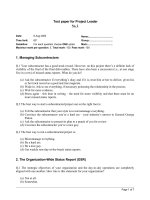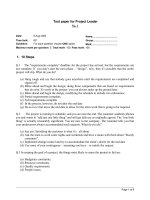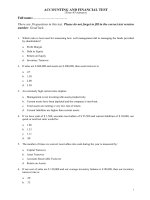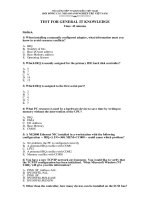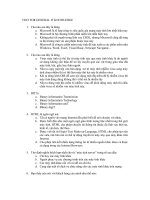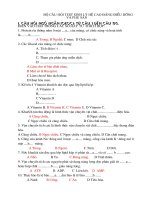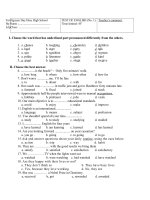Test 3
Bạn đang xem bản rút gọn của tài liệu. Xem và tải ngay bản đầy đủ của tài liệu tại đây (106.96 KB, 5 trang )
ĐỀ KIỂM TRA TRẮC NGHIỆM
THEO CHỦ ĐỀ BÀI HỌC
Unit 3: WAYS OF SOCIALIZING
I. PRONUNCIATION
Choose the word whose main stress is put syllable from that of the others in the
group.
1. A. polite B. pollen C. police D. pollute
2. A. focus B. remind C. circus D. patient
Choose the word whose underlined part differently from that of the others in the
group.
3. A. signal B. resign C. sign D. assign
4. A. sorrow B. pillow C. allow D. follow
5. A. whistle B. bristle C. little D. castle
II. GRAMMAR & VOCABULARY
Choose the word or phrase (A, B, C or D) that best completes each sentence.
6. Katie is a very _______________girl. She can make friends easily even though she is in a strange
place.
A. shy B. unfriendly C. sociable D. reticent
7. His achievements were partly due to the_______________ of his wife.
A. assist B. assistant C. assisted D. assistance
8. Arnold ________________for all the trouble he had caused to us.
A. complimented B. apologized
C. excused D. complained
9. Patricia is a very good nurse, who can___________________her patients well.
A. handle B. look C. deal D. work
10. He thought that he__________________the movie, so he gave the ticket to his brother.
A. saw B. has seen C. would see D. had seen
11. He said that he ________________me the book soon.
A. will return B. would return C. is returning D. returns
12. In the last thirty years, space exploration___________________great contributions to weather
forecasting.
A. makes B. has made C. is making D. made
13. _______________them went to bed before midnight.
A. Few B. A few C. Very few D. Few of
14. I tried ringing her all morning but I couldn't get .
A. through B. up C. down D. over
15. When I looked around the door, the baby__________________quietly.
A. was sleeping B. slept
C. is sleeping D. has been sleeping
16. You__________________better take off your wet shoes.
A. should B. would C. had D. could
17. He had _______________money that he had to travel everywhere on foot.
A. too little B. such little C. so few D. so little
18. The role of women in our society_________________been changed steadily.
1
A. would B. have C. must D. has
19. Don't try to ring the bell. It _________________.
A. is working B. works C. isn't worked D. doesn't work
20. Everybody was pleased with the ____________________ .
A. vegetable soup delicious hot B. hot delicious vegetable soup
C. delicious hot vegetable soup D. delicious vegetable hot soup
2
21. His short stories, __________usually had unhappy endings, were collected and published.
A. who B. which C. whom D. that
22. '____________I carry that bag for you?' 'Oh, thank you.'
A. Do B. Shall C. Will D. Would
23. "How about driving to the countryside this Sunday?" "_________________ "
A. That's a good idea. B. That's my pleasure.
C. Yes, I am driving. D. Never mind.
24. Last week Clara said "I'll do it tomorrow." She said she would do it______________________.
A. tomorrow B. the previous day
C. the following day D. yesterday
25. I don't know why Hans didn't go to the meeting. He said he_________________definitely going.
A. be B. is C. was D. would
26. That's________________story I have ever heard.
A. a ridiculous B. the ridiculous
C. the more ridiculous D. the most ridiculous
27. They read the words 'No Entry' ________________in large letters.
A. to write B. writing C. written D. that wrote
28. The number of cars on the roads _________________.
A. is increasing B. are increasing
C. are increased D. have increased
29. Their apartment looks nice. In fact, it's___________________.
A. extreme comfortable B. extreme comfortably
C. extremely comfortable D. extremely comfortably
30. By working day and night, they succeeded their work in time.
A. finished B. to finish C. finishing D. in finishing
31. Elvis Presley_______________in 1977.
A. dies B. died C. is died D. was died
32. They showed the. photos ___________________.
A. me B. for me C. to me D. with me
33. You ________________strike a match; the room is full of gas.
A. needn't B. mustn't C. should D. must
34. She didn't like it in this neighborhood at first. But now____________________here.
A. she got used to living B. she's used to living
C. she used to live D. she used to living
35. ___________enough money, we would have traveled by air.
A. If we have B. If we had C. unless D. had we had
III. Choose the underlined part in each sentence that s40uld
be corrected.
36. Jane asked Brian that he had ever been to South-east Asia and he said he had.
37. I don't know why is the elevator not working properly today.
38. In the end, she quit the job because it was too bored.
39. He said that he couldn't remember where had he left his car.
40. Many couples who both work must hire someone to take care of their children for they.
IV. Choose the item (A, B, C or D) that best completes the unfinished statement (or
best answers the question) about each passage.
I've always been a bit of an entertainer and played the funny man.
I was a part-time comedian for years, so I learned how to stand in front of audiences. It made me sure
of myself. I like being liked and I love making everyone smile.
I've lived in London all my life and have just moved to a larger house with my wife Clare and
our two children, Jimmy and Madeleine. We spend a lot of time just singing and dancing around the
house. I grew up with music because my dad is the pianist, Chester Harriott - who's still playing, by
the way. My working day is divided between television and writing cook books, though TV takes
most of my time. I spend about five days a fortnight working on the cooking programmes I appear in.
I eat all sorts of things at home but I only buy quality food. When I'm cooking, I experiment with
whatever is in the fridge - it's good practice for my TV series.
I'm a football fan and enjoy going to matches, but I'm a homeloving person really. I don't like
going to the pub but we do go out to eat about twice a month. There's nothing better than a night at
home playing with the children. I rarely go to bed before midnight. Late evening is when fresh
thoughts on cooking usually come to me, so I often write and plan my programmes then. When I
eventually get to bed, I have no trouble sleeping!
41. What is the writer's main purpose in writing the text?
A. to describe how he lives B. to say what makes him laugh
C. to talk about his cooking ideas D. to explain how he started in TV
42. What would a reader learn about Ainsley from the text?
A. He is a very good musician.
B. He likes to plan the family meals.
C. He is nervous about performing on stage.
D. He enjoys spending time with his family.
43. What does the writer say about himself?
A. He loves going out and meeting people.
B. He is very similar to his father.
C. He enjoys being popular.
D. He should go to bad early.
44. What does he say about his working life?
A. He would like to appear less on TV.
B. He gets his best ideas at certain times.
C. He prefers being a comedian.
D. He should practise cooking more.
45. Which of the following is the best description of the writer?
A. The popular TV comedian who enjoys cooking, watching football, and having a busy social
life.
B. The TV cook who loves making people laugh, watching football and, above all, having a
happy family life.
C. The singing TV cook who likes making jokes, playing with his children, and having an early
night.
D. The cook and comedian who takes great care about the way he cooks his food and enjoys
listening to music more than anything.
V. Choose the word or phrase (A, B, C, or D) that best (its each space in the following passage.
In Japan, politeness and good manners are very important and business meetings are very
formal. Business cards are also important and they (46)____________these at the beginning of a
meeting. They always look at them carefully, so you should do the same as they might think you're
rude if you don't. A lot of communication is non-verbal. They are very good listeners and may ask a
lot of questions to (47)_______they understand everything. In a conversation they wait longer before
they reply than westerners do, so it's important (48)__________speak in those long pauses but to
wait for their reply. In their culture it's rude to ask direct questions or to say 'No' or 'I disagree'. In
business it takes a long time to (49)___________a decision because they have to ask everyone in the
company. When they say 'Yes' it may mean 'I understand', not 'I agree', and when they smile it might
be because they don't know (50) to say. _________________
46. A. exchange B. change C. purchase D. barter
47. A. find B. notice" C. check D. identify
48. A. to not B. don't C. not D. not to
49. A. get B. make C. take D. gain
50. A. when B. that C. who D. what

